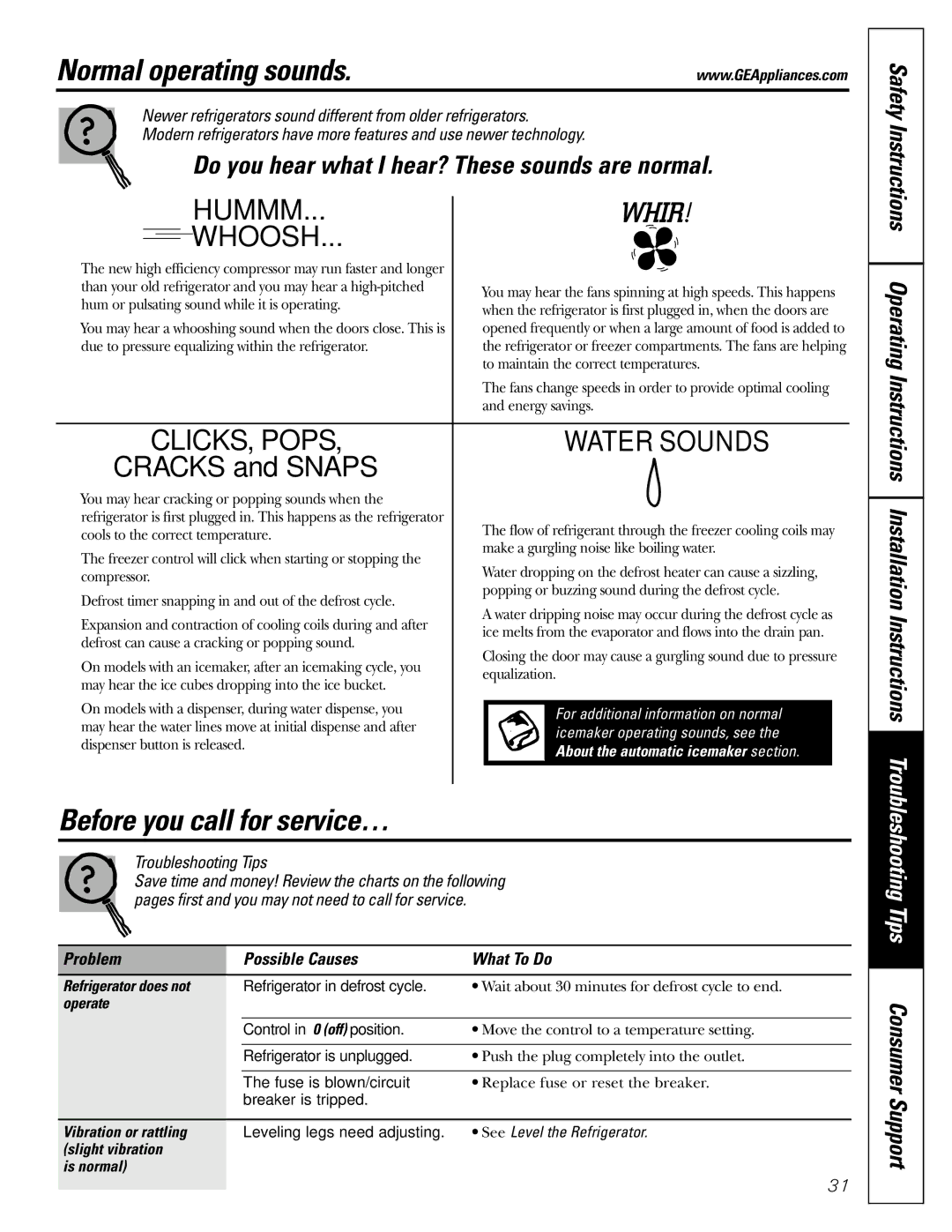
Normal operating sounds. | www.GEAppliances.com |
Newer refrigerators sound different from older refrigerators.
Modern refrigerators have more features and use newer technology.
Do you hear what I hear? These sounds are normal.
|
|
| HUMMM... |
| ||
|
|
|
| WHOOSH |
| |
|
|
|
| |||
|
|
|
|
| ||
|
|
|
| |||
■ The new high efficiency compressor may run faster and longer |
| |||||
than your old refrigerator and you may hear a | ■ You may hear the fans spinning at high speeds. This happens | |||||
hum or pulsating sound while it is operating. | ||||||
when the refrigerator is first plugged in, when the doors are | ||||||
|
|
|
|
| ||
■ You may hear a whooshing sound when the doors close. This is | opened frequently or when a large amount of food is added to | |||||
due to pressure equalizing within the refrigerator. | the refrigerator or freezer compartments. The fans are helping | |||||
|
|
|
|
| to maintain the correct temperatures. | |
|
|
|
|
| ■ The fans change speeds in order to provide optimal cooling | |
|
|
|
|
| and energy savings. | |
|
|
| ||||
| CLICKS, POPS, | WATER SOUNDS | ||||
CRACKS and SNAPS |
| |||||
■You may hear cracking or popping sounds when the refrigerator is first plugged in. This happens as the refrigerator
| cools to the correct temperature. | ■ | The flow of refrigerant through the freezer cooling coils may | |||
|
| |||||
■ | The freezer control will click when starting or stopping the |
| make a gurgling noise like boiling water. | |||
■ | Water dropping on the defrost heater can cause a sizzling, | |||||
| compressor. | |||||
|
| |||||
■ | Defrost timer snapping in and out of the defrost cycle. |
| popping or buzzing sound during the defrost cycle. | |||
■ A water dripping noise may occur during the defrost cycle as | ||||||
■ | Expansion and contraction of cooling coils during and after | |||||
| ice melts from the evaporator and flows into the drain pan. | |||||
| defrost can cause a cracking or popping sound. |
| ||||
| ■ Closing the door may cause a gurgling sound due to pressure | |||||
■ | On models with an icemaker, after an icemaking cycle, you | |||||
| equalization. | |||||
| may hear the ice cubes dropping into the ice bucket. |
| ||||
|
|
|
|
| ||
■ | On models with a dispenser, during water dispense, you |
|
|
|
| |
|
| For additional information on normal |
| |||
|
|
|
| |||
| may hear the water lines move at initial dispense and after |
|
| icemaker operating sounds, see the |
| |
| dispenser button is released. |
|
|
| ||
|
|
| About the automatic icemaker section. |
| ||
|
|
|
|
| ||
|
|
|
|
|
| |
Before you call for service…
Troubleshooting Tips
Save time and money! Review the charts on the following pages first and you may not need to call for service.
Problem |
| Possible Causes | What To Do |
|
|
|
|
Refrigerator does not |
| Refrigerator in defrost cycle. | • Wait about 30 minutes for defrost cycle to end. |
operate |
|
|
|
|
|
|
|
|
| Control in 0 (off) position. | • Move the control to a temperature setting. |
|
|
|
|
|
| Refrigerator is unplugged. | • Push the plug completely into the outlet. |
|
|
|
|
|
| The fuse is blown/circuit | • Replace fuse or reset the breaker. |
|
| breaker is tripped. |
|
|
|
|
|
Vibration or rattling |
| Leveling legs need adjusting. | • See Level the Refrigerator. |
(slight vibration |
|
|
|
is normal) |
|
|
|
31
Safety Instructions Operating Instructions Installation Instructions Troubleshooting Tips Consumer Support
